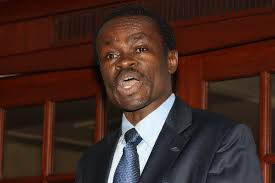By Byron Mutingwende
Professor Patrick Lumumba, a celebrated Kenyan anti-corruption proponent has registered his disdain for rhetoric on addressing corruption without the corresponding action, insisting the war on graft was far from over in Africa.
Lumumba made the remarks during the 2017 Zimbabwe Accountants Conference held at the Harare International Conference Centre last week in a speech entitled ‘Fighting corruption yesterday, today and tomorrow.’
“The African continent has great potential for development since it has a huge wealth of natural resources that can be tapped for the benefit of present and future generations. Poverty will remain embedded as long as the continent elects thieves into political leadership,” Lumumba said.
To illustrate his point, Lumumba gave an example of one James Sibari, a Nigerian who committed fraud in the United Kingdom but was elected into public office upon his return to his native country. Likening Nigeria to the microcosm of Africa, Lumumba said despite being arrested and extradited to the UK, Sibari was re-elected.
“African politicians, Zimbabwean included, speak against corruption on a daily basis on public forums. As soon as they leave the podium, they go back to their thieving ways,” Lumumba said.
To register a positive impact in addressing corruption, the academic called for a change of mindset on the part of the African leaders and the public. He warned that if Africa continues with the current corruption trajectory, it would remain poor and underdeveloped. Despite being the wealthiest continent, Africa sadly produces less and consumes foreign products.
Corruption is evident in hospitals where there is no essential drugs and medicines, in schools where there is less learning material and collapsed infrastructure and rampant poverty. As a result, African leaders have no faith in the local health and education system and access these services in Europe and North America at the expense of the ratepayers.
Despite the recognition that corruption is a scourge that has debilitating effects on the economy and social fabric, public sector corruption is on the rise. Appointment to public office often becomes a ticket to overnight riches. Greed and the culture of primitive accumulation by public office bearers is fuelling corruption.
Lumumba bemoaned the fact that African countries were churning out pieces of legislation that were not being followed through by politicians through a culture of impunity.
“Legislation does little to minimise corruption as long as impunity is not addressed. Kenya is among the first countries to sign the United Nations Convention Against Corruption but corruption still remains high in the country. African leaders have such legislation like the African Convention on Preventing and Combating Corruption and the SADC Protocol Against Corruption, among others but corruption is still high on the continent,” Lumumba said.
He bemoaned the fact that national anti-corruption commissions were doing little to address private and public sector corruption.
He added that there was a need to punish public office bearers for corruption instead of allowing them to do as they please even when found guilty. In Brazil, a president was impeached on a mere allegation of corruption whereas in South Korea, the former President is being investigated while in detention.
Dumisani Mthombeni, a lawyer and Director of the Zero-Tolerance Wise Youth Trust called for the establishment of a new narrative on condemning corruption beginning from primary school into colleges and tertiary institutions so as to re-construct society’s moral fibre that was being threatened by corruption.
Mthombeni also called for funding of the Zimbabwe Anti-Corruption Commission (ZACC) to capacitate it to fight corruption and encouraged the enactment of a law that gives the institution some arresting powers since its findings have often been ignored and ridiculed by the ruling elite.






